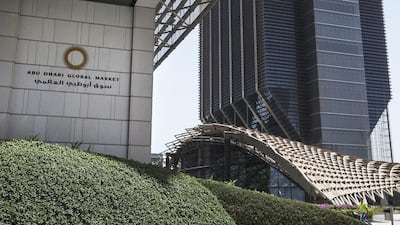Responsible investing will continue to grow in 2021 following a record year, as policymakers and financial institutions incorporate sustainability into their recovery plans to emerge from the pandemic driven-economic crisis, UAE minister of state Ahmed Al Sayegh said.
The UAE, the Arab world’s second biggest economy, has also experienced a significant increase in sustainable financing activities over the past 12 months, with signatories of the Abu Dhabi Sustainable Finance Declaration increasing their responsible investing activities, Mr Al Sayegh, who is also chairman of Abu Dhabi Global Market, said.
“I believe sustainability efforts and responsible investment opportunities will continue to gain momentum in 2021 as climate change moved up the agenda globally,” Mr Al Sayegh told the Abu Dhabi Sustainable Finance Forum.
“The increase of investor interest in sustainable investing is arguably the most important industry trend expedited by the pandemic."
In the UAE alone, reporting on corporate sustainability activities has risen to 51 per cent of the top 100 companies, up from 44 per cent in 2017, he said, citing KPMG data.
The world has a “critical window of opportunity” to make impactful changes in the wake of the pandemic. However, this requires combined efforts to “strengthen each other’s future resilience and support sustainable investments and developments”, he told the third edition of the annual event, which was held online this year as a result of the pandemic.
ADGM, Abu Dhabi's financial free zone, launched its sustainable finance agenda in 2019 and now has 41 private and public sector entities as signatories to its Sustainable Finance Declaration. These include local and international financial institutions, with new additions including Emirates Nature – WWF, the Clean Energy Business Council, French lender Credit Agricole, Invesco and one of the world’s biggest asset manager, BlackRock.
Sustainable financing involves funding or investing in companies or projects that have a positive environmental or social impact. Among other things, it includes issuing bonds, sukuk or long-term loans for projects such as renewable energy developments or investments into companies that meet defined environmental, social and governance standards.
The amount of assets held in sustainable funds globally has climbed to an all-time high of more than $1 trillion, according to investment advisory company Morningstar. The issuance of green bonds and loans has risen from a low base a decade ago to an estimated $320 billion in 2020, bringing the outstanding amount of green debt to over $1.5tn, Tao Zhang, deputy managing director of the International Monetary Fund said in November.
The momentum in sustainable funding picked up pace in 2020, with the third quarter seeing a record $155bn raised. There was an eight-fold increase in the sale of social bonds alone to $85bn in the first nine months of last year, according to financial data company Refinitiv.
Despite the pandemic, private and public sector entities have rolled out sustainability programmes as the UAE has pledged to reduce its carbon emissions by a quarter by 2030. The country recently increased its clean energy and carbon emissions targets as part of its Paris Agreement commitments.
Abu Dhabi National Oil Company is looking to establish a "hydrogen ecosystem" that will allow it to meet growing global demand for the lighter and cleaner gas that is emerging as an alternative to fossil fuels. Clean energy firm Masdar is rolling out the region’s first green real estate investment trust, while Abu Dhabi’s department of energy, Abu Dhabi Securities Exchange and ADGM are planning a Green Bonds hub.
To mitigate the environment and climate change risks to the country’s economy and its physical infrastructure, the UAE on Wednesday also launched the National Sustainable Finance Framework.
The initiative rolled out jointly by ADGM and the ministry of climate change and environment will create an “enabling environment” for development of sustainable financial products and the flow of private capital to low-carbon developments and projects, UAE minister of environment Abdullah Al Nuaimi said at the summit.
“There is critical need for close coordination and collaboration with the private sector, in particular, the scale of investment required is beyond the capacity of the public sector,” the minister said.
“We seek to move side-by-side with our partners in the private sector, as they embrace sustainable finance.”
The UAE, he said, is confident that the new framework will improve the supply and demand of sustainable investment products and sustainability-linked projects in the country.
Local and international lenders in the UAE have also stepped up efforts to boost the availability of green financing to public and private sector entities.
HSBC on Wednesday said it has set up a dedicated sustainable and transition finance team in the Middle East, North Africa and Turkey region that will help institutions, corporates and individuals transition to a more sustainable economy.
“Our best chance to achieve a successful global transition to net-zero is in partnership, where the public and private sectors are working together to create the optimal conditions for sustainable growth and are aligned on a common goal,” Noel Quinn, HSBC group chief executive, said.
The lender has already announced plans to support customers with between $750bn and $1tn of finance and investment by 2030.


